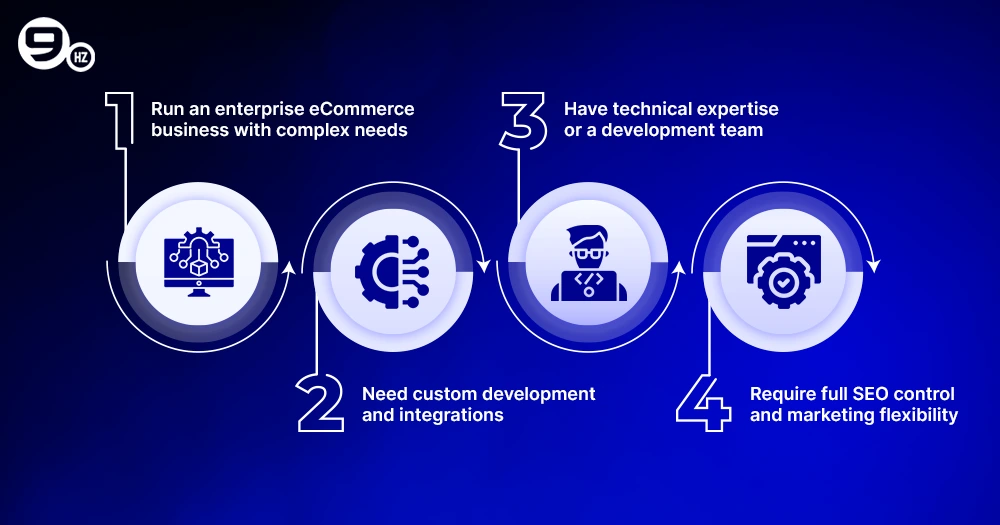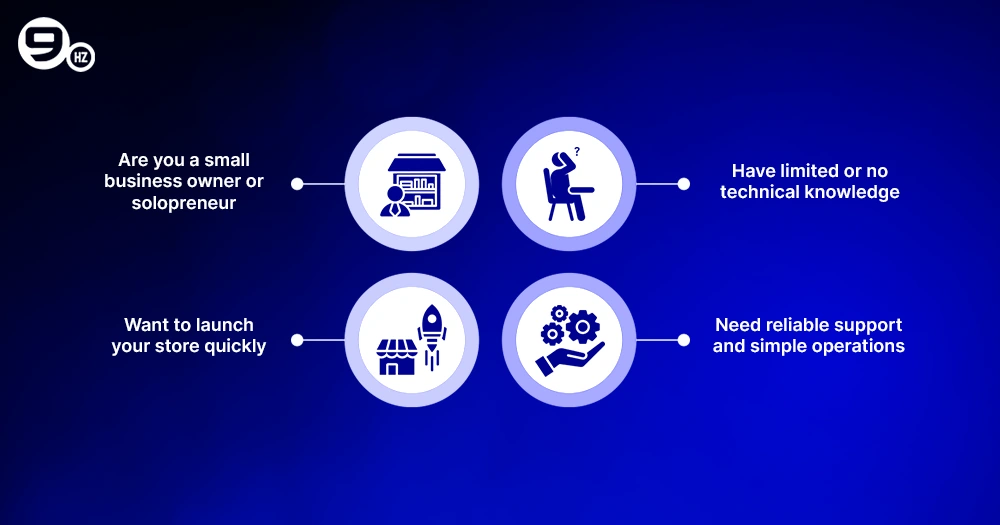Imagine trying to set up an online store in 2025, with the uncertainty of choosing between Magento vs Shopify! Both Magento and Shopify are prominent eCommerce platforms, yet they cater to vastly different business needs. One is a playground for all kinds of customizations and controls; the other is gentle on your users and gets the store up quickly.
Are you prepared to choose an eCommerce platform that will fuel your vision? The Magento vs Shopify debate is a crucial decision any business owner will have to make, with success in the competitive landscape at stake. New data reveals that Shopify powers 24% of the top one million websites in the USA, while Magento holds an 8% share, making both platforms the safest bet for eCommerce businesses looking to go online.
This article dives deep into the Shopify series guide to help you with Magento comparisons and ultimately help you make the right choice for your ecommerce store: Magento Commerce or a Shopify plan. We will thoroughly examine their features, customization options, and much more to determine what is best for you.
Magento Vs Shopify: Market Stats
Both Magento vs Shopify continue to reign over the eCommerce platforms landscape in 2025. While Shopify powers millions of online stores across the globe, Magento Commerce holds sway with enterprise-level entities.
With Adobe-acquired Magento, its presence in the Magento marketplace and eCommerce business ecosystem has grown significantly, especially for those businesses that require higher customization needs. Let us look at some important market stats for both platforms before we dive into the details.
- According to BuiltWith (2025), Shopify powers over 4.9 million well-visited websites worldwide, with the USA accounting for more than 68% of the user base.
- Magento (Adobe Commerce) runs more than 165,000 live websites, with strong adoption among enterprise-level businesses demanding heavy customizations and custom development resources.
- Shopify has been growing at a rate of 20 percent year over year in the small business space, mostly due to its low barrier to entry and all-in-one hosted solution.
- Meanwhile, Adobe Commerce Cloud, which includes Magento, has gained significant traction in the B2B sector, with over 25% of B2B eCommerce enterprises in the USA adopting this platform.
The numbers clearly indicate the distinction: Shopify is the choice for small merchants and new, fast-growing startups, while Magento is preferred by big companies with complex operations.
What is Magento?
Known for its flexibility, scalability, and developer-friendliness, Magento considers itself an open-source platform. Originally released in 2008 and acquired by Adobe in 2018, Magento comes in two main variants:
- Magento Open Source: Free to use, self-hosted version.
- Magento Commerce / Adobe Commerce Cloud: Paid, cloud-hosted version with advanced features for enterprises.
Magento’s open architecture makes it well-suited for custom solutions, heavy third-party app integrations, and custom themes. With Magento, you have full control over every aspect of your eCommerce store, from URL structure to inventory management, which fits those companies that either have technical people in-house or have access to Magento experts.
Take your eCommerce to the Next Level with Our Expert Magento Developers
What is Shopify?
Shopify is a hosted eCommerce solution that features a simple-to-use website creator, web hosting, and marketing tools for speedy setup and scalability. It was founded in 2006 and emerged as a market leader by making it possible for online stores to be started in record time. Shopify features:
- Shopify features include a basic admin panel.
- Shopify App Store with thousands of apps offering extra functionality.
- A variety of Shopify website templates and themes.
- The platform also integrates with third-party payment gateways.
Shopify also has tiered Shopify plans that start at Basic Shopify for $29/month, up to Shopify for $79/month, and Advanced Shopify for $299/month, with Shopify Plus for $2,300/month for business entities.
Its drag-and-drop website builder does not need coding skills, so it is ideal for Shopify users who are technologically not very advanced. Shopify hosts your site and secures it, so you don’t need to bother with that.
Case Study: A hypothetical retailer, TechTrend Innovations, employed Magento Commerce Cloud to operate a number of online stores with separately personalized themes, optimizing their operations across the world and increasing sales by 20% using personalized marketing capabilities.
Shopify vs Magento: Comparison Chart
To compare Magento vs Shopify, a side-by-side comparison is necessary. This Shopify comparison chart lists major differences in customization, web hosting, scalability, and ease of use. If you need advanced customization or ease of use, this chart provides you with a simple means to select the ideal eCommerce platform for your business. Below is a side-by-side Shopify comparison chart to compare Magento features with Shopify features:
| Feature | Magento (Adobe Commerce) | Shopify |
|---|---|---|
| Hosting | Self-hosted / Adobe Commerce Cloud | Fully hosted |
| Coding Skills Required | High | Minimal |
| Customization Options | Extensive customization | Limited customization |
| App Marketplace | Magento Marketplace | Shopify App Store |
| SEO Control | Full control over SEO and URL structure | Limited control |
| Scalability | High – Ideal for enterprise businesses | Medium – Best for small to mid-sized |
| Pricing | Varies (can be expensive) | Starts at $29/month (Shopify Plan) |
| Themes | Requires dev skills or paid themes | Easy-to-use Shopify themes |
| Extensions & Plugins | Thousands of Magento extensions | 8,000+ third party apps |
| Support | Community + Adobe support (Commerce plan) | 24/7 dedicated support |
| Analytics | Advanced analytics & Google Analytics | Basic analytics with upgrade options |
| Security | Customizable; depends on hosting | PCI-DSS compliant out of the box |
Simplify Selling Online with a Sleek, High-converting Shopify Site
Magento Vs Shopify: Pros and Cons
Knowing the benefits and drawbacks of any option helps one make an informed buying decision. Magento offers some strong bespoke solutions and control for the biggest companies, but its simplicity and speed to market trade-off greatly with Shopify.
Analyzing the trade-offs helps companies more precisely match their own eCommerce store goals with the capabilities of their preferred platform. To further guide this Shopify vs. Magento discussion, let’s review both sides of the ledger.
Magento Pros
Magento is quite strong and flexible. Big businesses will welcome Magento extensions, bespoke development enabled by it, and enterprise-grade processes. For scalable, innovative solutions in eCommerce businesses, strong product management, broad SEO control, and a marketplace for Magento make also a popular choice.
Highly flexible and customizable
Magento promotes more degrees of customizing with an open-source framework. Developers may create their own unique solutions covering any business logic, user journey, etc. At the corporate level, where operating demands may be somewhat distinctive, this adaptability is quite important.
Scalable for large or complex operations
Magento Commerce can scale to manage more visitor volume, comprehensive product listings and set up, and complicated catalogs than Shopify can. Larger companies looking for a dependable eCommerce platform at scale turn first to Magento.
Ideal for enterprise-level businesses
Although Magento Enterprise and Adobe Commerce online offer more sophisticated feature sets at a higher price point, they include a range of useful B2B features, such as personalized content and AI-driven product recommendations, which deliver the complex value that enterprise businesses need.
Rich API documentation for integrations
Excellent API documentation The excellent API documentation enables Magento to provide the necessary connectivity for contemporary online retailers by allowing integration with ERP systems, other CRMs, and external applications.
Extensive SEO and marketing capabilities
Magento gives you full power over the text, meta tags, and URL structure. This means it has great SEO tools that make your site more visible online. It also has a lot of marketing tools that can help you run focused ads.
Wide developer community and support
Experts, companies, and users from all over the world support Magento. It’s easy to get help with development, learn the best ways to do things, and contrast Magento with other choices for any online store.
Rich ecosystem of Magento extensions
The Marketplace for Magento has a lot of different add-ons for Magento. With these, you can add new features to your store without having to build them from scratch. This is beneficial for companies that require custom development.
Magento Cons
Magento has several shortcomings even if it is really strong. Usually with greater development expenses, it needs technical knowledge, a consistent server service, and creating a Magento shop may also take more time as it is more complex. Those without technical skills or the need to enter the market rapidly will find this less suited.
Requires coding knowledge
Magento, on the other hand, needs good coding skills to make even small changes. When a small or new business lacks coders or technical professionals, it can be challenging to make necessary changes.
Higher cost of development and maintenance
Even though Magento Open Source is free, the costs of development, storage, and maintenance can add up quickly. When you buy Adobe Commerce online storage or hire Magento experts, the total amount you pay will add up.
Slower time-to-market
Magento takes longer to set up because you have to make your own features. This holdup can make it hard for companies that want to get into the market fast.
Needs a reliable hosting provider
Because Magento is self-hosted, it is important to choose the right hosting provider. An improper hosting setup can negatively affect performance, security, and downtime, all of which are vital for an ecommerce platform.
Turn Your Ideas into a Stunning Shopify Storefront
Shopify Pros
Given its swift speed and simplicity, Shopify distinguishes itself. It allows startups and small enterprises to rapidly create professional web shops without knowledge of coding knowledge. There are plenty of applications on the Shopify App Store, and assistance is accessible around the clock. For proprietors of present e-commerce stores, this is a wise decision.
Easy-to-use website builder interface
Shopify’s intuitive website builder provides the ability for anyone, even if they have only rudimentary technical knowledge. Small business owners and solopreneurs find it extremely appealing to build an elegant online business without touching a line of code.
Fast setup and launch
Shopify’s pre-built themes let you set up a full e-commerce store in a day, unlike Magento, which can take weeks.
Fully managed web hosting
The best part of Shopify is that every Shopify plan includes web hosting, so there is no need to manage servers or troubleshoot uptime issues, meaning more time spent selling and less time worried about infrastructure.
24/7 support and extensive documentation
Shopify provides live support 24/7, including chat, email, and telephone support, in addition to a ginormous knowledge base. Unlike Magento, you do not have to rely on a third-party developer for everything.
Secure and PCI-compliant out of the box
Every Shopify store has security built in, including SSL certificates and PCI-DSS compliance. This is great for someone who doesn’t know the security protocols needed to run an eCommerce platform.
Diverse marketing tools and features
Shopify’s in-house marketing suite includes email automation, discount codes, and integrations with both Google and Facebook. Shopify works seamlessly with add-ons in the App Store to help you boost both traffic and conversions.
Wide range of apps on the Shopify App Store
Shopify’s App Store provides you with more than 8,000 apps covering diverse areas like inventory management and artificial intelligence. These apps easily extend your Shopify store with new functionality.
Shopify Cons
Though it offers several great features, Shopify has some issues. Customizing it is more difficult than with Magento Commerce Cloud, and many of its capabilities rely on purchased applications from other firms. For businesses that want a more tailored eCommerce platform, Shopify also imposes certain limitations on URL style and server flexibility.
Shopify’s limitations on custom backend features
Shopify may be robust, but it does not provide the same level of flexibility as Magento, which uses open-source software. The platform may not suit companies that depend on sophisticated processes running in the background.
Extra cost for third-party apps
There are numerous must-have features available as third-party apps that could significantly increase your costs. Magento provides greater in-house adaptability with the assistance of free extensions.
Limited control over URL structure
Some Shopify URLs are rigid without support for extensive search engine optimization customizations.
Fewer advanced customization options
With Magento Commerce Cloud, you have more possibilities to build advanced custom solutions. That’s why it isn’t as well equipped for large businesses that demand total ownership of their technology solutions.
Advantages of Magento and Shopify
Analyzing the several choices will help you choose which fits your company’s requirements. Your company strategy will mostly determine how much each platform helps you. Magento’s open-source architecture makes complex modifications requested by corporate businesses possible, unlike Shopify’s emphasis on simplicity of use and easily available sales capabilities. Such a comparison will let you decide with knowledge about the ideal platform for your company.
Advantages of Magento:
If you want complete control, close relationships, and sophisticated customizing—that is, if your eCommerce company, Magento is the ideal solution. Large businesses with technical know-how or development teams that can leverage Magento’s open-source character to build flexible, innovative solutions and a Magento shop experience fit just for them will find it most successful. Let’s break it down further by looking at who each platform is best suited for.
Run an enterprise eCommerce business with complex needs
When it comes to advanced inventory control and automating work processes, Magento Commerce can be a very useful tool.
Need custom development and integrations
Magento works best when it needs to be deeply integrated with ERP, CRM, or third-party shipping tools. The documentation for its API and the community of Magento plugins make custom development at scale possible.
Have technical expertise or a development team
Since Magento is open source, it needs developers to keep it running and add new features. The tool can be made to work better if you have an in-house team or access to experts from around the world.
Require full SEO control and marketing flexibility
Magento gives you more SEO power than any other platform, from information and tags to setting up Google Analytics. It lets you make personalized ads and marketing tools for long customer trips.
Advantages of Shopify:
Conversely, Shopify is the choice if you appreciate rapid setup and simplicity of usage. Built-in web hosting, tools, and easy-to-use website builder help Shopify to be an excellent option for small enterprises or consumers who lack technological expertise but want to launch their own online company.
Are you a small business owner or solopreneur
Shopify is the perfect mix of low cost, ease of use, and ability to grow for people who want to start an online business with a few goods that need to be shipped quickly.
Want to launch your store quickly
Shopify’s ready-made website designs and automatic setup wizards make it possible to open your store in just one day. With Magento eCommerce, this is not possible.
Have limited or no technical knowledge
Shopify is for people who don’t know how to code. It has a drag-and-drop website maker that lets anyone run the shop without the help of developers.
Need reliable support and simple operations
By means of 24/7 support and managed services, Shopify removes the strain of handling technical difficulties, server maintenance, or plugin updates thus allowing business owners who want to focus on growth to have a platform.
Conclusion: Magento vs Shopify
The needs of your online retailer will decide whether Magento vs Shopify is best for 2025. Shopify is the best e-commerce platform accessible to small businesses and startups because of its user-friendly website builder, fairly priced pricing, and big Shopify App Store. For owners of businesses without technological knowledge, its fast setup and 24-hour assistance make it perfect. However, Shopify’s restrictions on extensive modification might be problematic for established e-commerce businesses.
On the other hand, Magento Commerce and Adobe Commerce Cloud are aimed for companies in the industry demanding great scalability and personalization. Though smaller online businesses find technical skills and higher costs challenging, the Marketplace for Magento and open source aspect of Magenta provide unmatched independence. Magenta stores with heavy traffic would find Magento the perfect e-commerce platform as it offers B2B solutions and improved inventory management.
Think of yourself as a company owner, mixing speed with control. You companion for short releases is Shopify. Go with Magento for creative ideas and international reach. Sort your growth goals, financial situation, and technical knowledge. Both are e-commerce systems, however the argument between Magento vs Shopify will depend on your online business idea.
Frequently Asked Questions
1. Is Magento better than Shopify for large businesses?
Yes, Magento works best for big companies, especially ones that need a lot of advanced customization and custom development. Magento Commerce Cloud, on the other hand, has features that are designed for large businesses with complicated e-commerce stores.
2. Can I migrate from Magento to Shopify or vice versa?
Of course! Going from one platform to another takes technical know-how, especially if you’re going from Magento to Shopify or Shopify to Magento. By hiring professionals, you can be sure that your eCommerce site data will move over without any problems or loss.
3. Which is more beginner-friendly?
Without question, Shopify is easier for people who are just starting out. It’s perfect for small businesses or people who aren’t very good with computers who want to open an online store because it comes with a simple website builder, web hosting, and doesn’t require you to know how to code.
4. Are there hidden costs in either platform?
Yes, there may be secret costs with both systems. For example, Shopify’s prices go up when you add third-party apps. Magento, on the other hand, is more flexible but often costs more for storage, Magento extensions, and custom solutions during development.
5. Which platform is better for SEO?
Magento is better for SEO because you have more control over the layout of URLs, metadata, and features like Google Analytics. Even though Shopify has good tools, it isn’t as good for SEO as Magento, which is easy for online shops to get around since Magento is open source.



![How to Build an App Like MyFitnessPal? [Cost in 2025]](https://theninehertz.com/wp-content/uploads/2024/10/build-an-app-like-myfitnesspal.webp)







